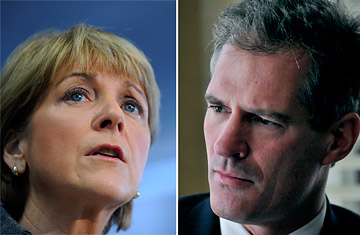
Democratic Massachusetts attorney general Martha Coakley, left, and Republican state senator Scott Brown
Andrea Penney has never thought of herself as a political type. Until a few weeks ago, the 59-year-old registered nurse and lifelong resident of Salisbury, Mass., had never so much as put a bumper sticker on her car or a sign in her yard, she says. But in the past few weeks, she has done both. And Monday afternoon found her at her first political rally, braving the cold and a light snow with several hundred others along Main Street.
She was there to see and shake hands with Scott Brown, the Republican state senator who may be just hours away from one of the biggest upset victories in modern political history. If the latest polls are to be believed, Brown holds a narrow edge in his bid to win a special election to the Senate — from a state that more than any other is synonymous with liberalism. Even more remarkable, it is a seat that has been represented nearly continuously by a Kennedy for over half a century. Democrats now say privately that their last hope is that a superior get-out-the-vote operation could keep the seat from slipping away.
"Health care — that's what motivated me," Penney said. "The health care thing pushed me over the edge." President Barack Obama's effort to transform the nation's health care system was indeed cited by many of the Brown voters I talked to on Main Street. And therein lies a bitter irony: universal health care was the cause that meant more than any other to the late Senator Ted Kennedy, whose seat will be filled by this special election. Further, Massachusetts is the state that has come closer to achieving it than any other, with a 2006 law that was championed by its Republican governor at the time, Mitt Romney.
Only two months ago, Brown's opponent, state attorney general Martha Coakley, sat atop a 30-point lead in the race. If she loses, many will place a significant share of the blame on her weakness as a candidate. She ran a lackluster campaign, seemingly unaware of the danger she was in. When the Boston Globe asked her why she held so few public events, she replied dismissively, "As opposed to standing outside Fenway Park? In the cold?" — a reference to one of Brown's online videos. If that weren't enough to alienate Red Sox Nation, she probably finished the job when she suggested in an interview that the team's legendary pitcher Curt Schilling (a Brown supporter) was a Yankees fan.
But what worries Democrats even more are the indications that what has hit Coakley is the leading edge of a national tide. Her difficulties stem from the fact that independents and more-conservative Democrats are moving to Brown in droves. "I know that people are frustrated," she said at a Martin Luther King Jr. birthday breakfast on Monday. "They're angry."
If Brown wins, the immediate effect on the health care bill could be profound — something he points out at every campaign appearance, as he pledges to be the "41st Senator." Lacking 60 votes, Senate Democrats will be unable to overcome a GOP filibuster of the health care bill — which has passed both the Senate and the House but will have to return to both chambers for final votes once the two versions are reconciled. The only way to avoid another Senate vote, party strategists say, would be for the House to pass the exact version that the Senate approved in December, thus sending the bill directly to Obama.
At this point, however, that looks like a difficult prospect for two reasons. The first is that House liberals object to many provisions in the more-conservative Senate legislation. The second is that more-conservative Democrats may well be so rattled by the victory of a Republican in Massachusetts that they could reconsider their own support for the measure. House Speaker Nancy Pelosi has little margin to work with; the bill passed her chamber in November by only five votes.
Brown told the crowd in North Andover that this election is a chance for Massachusetts to "send a message." One thing that voters can know for certain as they go to the polls on Tuesday: they have gotten Washington's attention.
